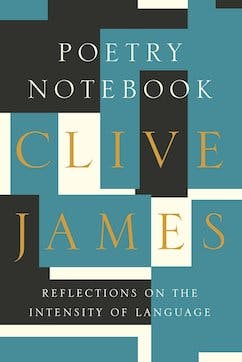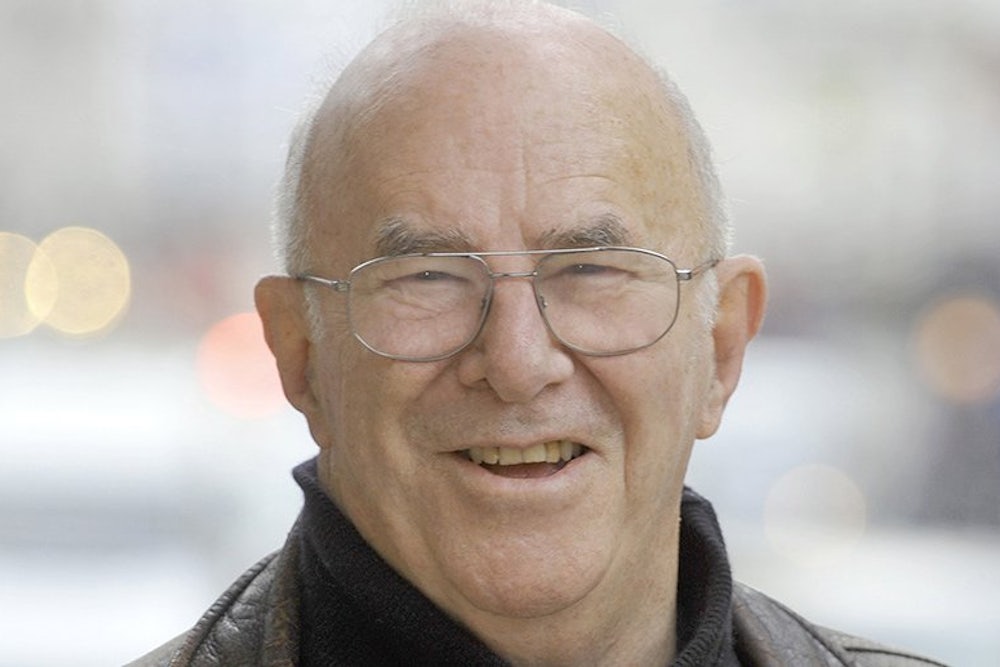For a certain demographic last September, the breaking news was all about five stanzas. News outlets, from the Guardian to Slate, were reporting the existence of a poem on the subject of death, called “Japanese Maple.” You might’ve thought you were living in a Martin Amis story, the one where poets have agents and screenwriters have to endure rejection slips from little magazines. It’s hardly wire-worthy, after all, a poet occupied with his mortality. The market for morbid poems is so flooded it could float an ark.
But “Japanese Maple,” which appeared in The New Yorker, wasn’t your typical poem, nor its author your typical poet. Clive James was—is—one of the preeminent culture critics of the last 40 years—and a celebrity, to boot. Born in 1939, he left Sydney for London in the early ’60s. He made a name writing for publications like the Times Literary Supplement, back when the byline was often redacted. (An unsigned essay on Edmund Wilson made James infamous the old-fashioned, germy way: It went viral by word of mouth.) James became a TV critic in the ’70s, and eventually wound up on TV screens interviewing celebrities and hosting documentaries. (Princess Diana was a lunch companion.) He has filed on auto-racing, Larkin, musicals, and The Da Vinci Code. Nevermind Žižek; James’s beat ranges from Benjamin to Bogdanovich.
Since being diagnosed with emphysema and leukemia, however, the main event for James has been the poems. Over the last few years they have materialized steadily in magazines, and some parts of the media have duly taken up a deathwatch, the ghoulishness only augmented by a voyeuristic interest in his love life: In 2012, it came out that James had been cheating on his wife with a former model. (“Is this devastating poem Clive James’s farewell to his family ... and apology for his eight year affair?” asked The Daily Mail, after the TLS printed a poem called “Holding Court” in February 2013.) Stories about the affair tended to identify James as “broadcaster”—in addition to some variation of writer, raconteur, or critic. But North Americans, less familiar with James’s TV work, found themselves transfixed by an alternate universe in which the sins of a translator of the Inferno can fire up the tabloids.
James’s recent poems, of course, are so much more than fuel for Grub Street; they represent the very best work James has ever done in verse. Here are the final, moving stanzas of “Japanese Maple”:
My daughter’s choice, the maple tree is new.
Come autumn and its leaves will turn to flame.
What I must do
Is live to see that. That will end the game
For me, though life continues all the same:
Filling the double doors to bathe my eyes,
A final flood of colors will live on
As my mind dies,
Burned by my vision of a world that shone
So brightly at the last, and then was gone.
The old-school rhyme scheme (“shone”/ “gone”), the flush and fitted iambs (“What I must do”), the simple, almost elemental nouns (“leaves,” “flame,” “world”)—unlike many contemporary poems, which tend toward opacity and fragmentation, James’s is apprehensible and self-contained. Minor but masterful moments, like the break after “What I must do,” or the doubling up of “that,” project a sense of control and provide just enough jolt. “Japanese Maple” lowers roots into the reader’s mind.
Many of James’s artistic heroes and touchstones were good at beguiling an audience. “Whole generations of Jewish literati were denied the opportunity of wasting their energies on compiling abstruse doctoral theses,” James wrote in his great book of essays, Cultural Amnesia. “They were driven instead to journalism, plain speech, direct observation and the necessity to entertain.”
A compulsion to compel drives many of James’s other subjects. Whether they work in Viennese coffeehouses, the music business, or Hollywood, James’s heroes (another man’s hacks or hams) strive for clarity and economy, precisely because they don’t have the luxury to be opaque. They assume that their audience is restless, demanding, and frugal with its disposable income. From their example, James seems to have extracted the sort of practical tip the typical poet tends to resent: The person who means to reach his reader had better intensify the message, especially if he’s running short on time.

James’s new book of essays, Poetry Notebook: Reflections on the Intensity of Language, makes plain at the outset a desire to “keep things terse and particular.” Many of these pieces are short essays that address a general reader and conduct close readings of particular poems, even particular lines; many were commissioned by Christian Wiman, the former editor of Poetry magazine (to whom James dedicated a recent collection of poems). “I was getting old,” James observes in the introduction, “and the concentration necessary for writing a long piece seemed better reserved for writing poems, when they came.”
The essays may be compact and entertaining, but they have a subtle way of encouraging self-scrutiny. James often makes generous assumptions about the reader of Poetry Notebook; offhand sentences casually suggest she balances a Norton’s worth of verse on the tip of her skull. “Read [Robert Lowell’s poem] ‘A Quaker Graveyard in Nantucket’ again,” he encourages at one point, “or merely recall the bits of it that you have in your memory.” Elsewhere, he tosses off lines like, “most of us would not have much trouble in compiling a list of well-separated poems that we keep complete, or almost complete, in our heads.” One hardly has the heart to point out that 60-plus years of MFA workshops have ensured that if canonical poems are to reside anywhere, it’s not between the ears of “most of us,” who would rather labor at our own poems than consume the ones that already exist.
But James’s mode is deliberate, even strategic. His confidence in the capacities of contemporary readers is in fact a shrewd, inoffensive way of campaigning for the heavies in the culture wars. “Everyone knows the first line [of Hopkins’s ‘Spring’] because everyone knows the poem,” translates to, “It wouldn’t hurt to have some Hopkins by heart, whatever your walk of life.” This is James’s general approach to prescription: pretending the reader already has an interest in antibiotics. In Cultural Amnesia, he’s always commending to us the one book that will serve as the ideal doorway into some foreign language. The underlying, cavalier assumption—that his reader has the time, desire, and wherewithal to tackle the language in the first place—is less a sign of an out-of-touch expert, than of a scrappy, self-made scholar who can’t bear to depend on translations and can’t imagine his reader choosing to be any different.
The true object of James’s devotion, however, is something he calls, channeling Frost, “the choppily well-separated thing.” He means a poem with internal integrity, its every word pertinent and poised—a product that has come to be a curio in our age of overproduction. “On both sides of the Atlantic, and in Australia,” James recounts, “the creative writing schools churned forth slim volumes by the thousand, all of them supposedly full of poetry but few of them with even a single real poem in them.” Of course, the recently matriculated would pick at James’s adjective: “real” according to whom? They would turn the table of contents upside down and shake out a patriarchy.
Real readers—the few who don’t aspire to tenure—know what James means and will forgive him his apparent chauvinism; he cops to as much in the book itself, when he worries that he “might not have done enough” on behalf of women writers. It’s a fair self-criticism. And yet: “Will I get myself off the hook just by saying that I ended up with almost as many lines by Elizabeth Bishop in my head as by Robert Lowell?” It’s a fair question; I’d bet my Beauvoir Reader that James has more lines by women internalized than almost of any us.
At bottom, James is loyal to poems, not poets. He’s concerned with the question of why some stretches of verse stick with the reader and why others don’t. It’s clear he has spent years white-boarding problems that contemporary poets no longer give much countenance. For example, most of us dabblers would delight to be able to manage a brilliant line or two of poetry per poem. But James is preoccupied with not just how to generate brilliance—feat enough—but how to muffle it slightly so that it serves a larger light show. As he says of Frost: “His easy-seeming, usually iambic, conversational forward flow is a deception, a way of not just bringing show-stopping moments to your attention but of moving them past your attention, so that you will form the correct impression that he has wealth to spare and does not want the show stopped for such a secondary consideration as brilliance.” Brilliance as a “secondary consideration” is, well, brilliant—a counterintuitive point at a time when the practitioners who tend to trend, like Frederick Seidel and Patricia Lockwood, specialize in show-stopping lines. Elsewhere, James reminds us that poets once taught readers how to pronounce a word simply by its placement in a pattern of stresses. He can talk couplets, alliteration, nuts, bolts. It’s not that Poetry Notebook is perversely arcane; it’s rather as if a ballet textbook had readmitted to its pages, after years of doing without, the pirouette.
“At the moment, I am in the slightly embarrassing position where I write poems saying I am about to die and I don’t,” James told The Spectator last fall, laughing. James is still with us and, on virtually every page of Poetry Notebook, shedding sparks. Readers who make the mistake of finding his taste for canonical poems “conservative” should still get a charge from his bloody-minded drive. “Reading his absurdly confident critical prose,” James writes of Ezra Pound, “I could scarcely catch my breath when he talked about poetry as if it were the most exciting thing in the world, which indeed it is.” You could say much the same about Poetry Notebook, a breathtaking book by an old master running out of breaths.
